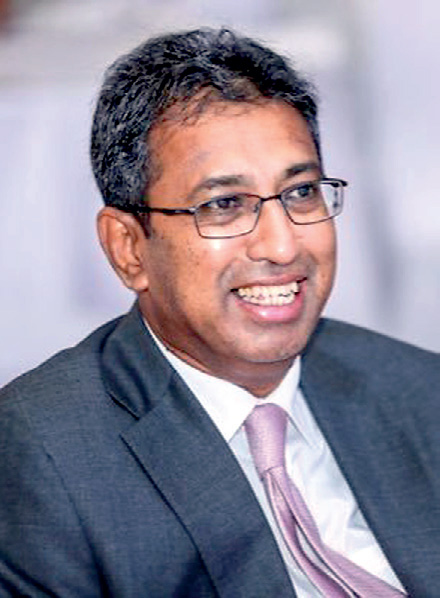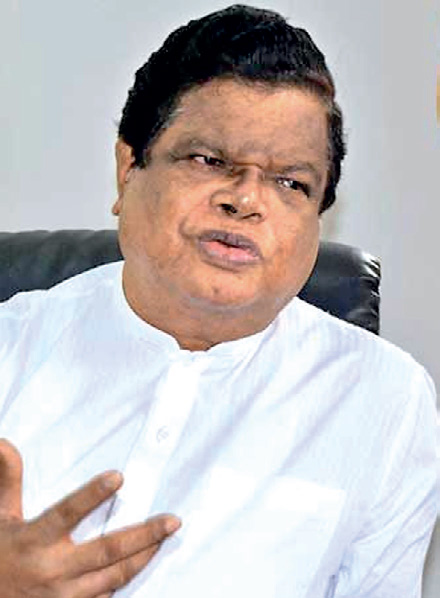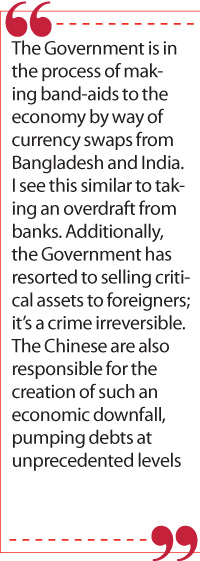Wednesday Feb 25, 2026
Wednesday Feb 25, 2026
Monday, 9 August 2021 00:00 - - {{hitsCtrl.values.hits}}

Harsha De Silva

Bandula Gunawardena
By J.L. Jayawardena
An account of facts discussed
The basic premise of this debate was to discuss the measures available, being taken to reduce the gap between consumption and the earnings, and in turn to improve the current account balance i.e. primarily the expenditure and revenue of imports and exports respectively. I attentively watched the program on YouTube and have captured salient points which I intend to document in this article.
In short, the modalities proposed by the two individuals despite declaring to be independent of party politics, are based on their party politics, defensive, divergent and opposite. Minister Bandula G’s arguments were no different to the Government policies and I see him as a mouthpiece of the present Government. In many instances he failed to provide substantiative counterarguments, despite being highly verbose in Sinhala.
For example, while presenting year-on-year debts and counting the value of bonds at secondary market, attempted to convince for year 2020 is less than the immediate past. Again ‘face marks’ produced by locals said to be a fixed price for a three-month term, however, the contacts between the suppliers have provisions for price variation aligned with exchange parity rate. This shows the Government attempts to mislead the public without divulging correct information for short-term gains, and suppressing the voices of various groups.
The Minister’s preamble was very exciting as he reiterated comparing the parliamentary debates past and present. He recognised the level and the calibre of former parliamentarians viz: ministers Dr. N.M. Perera, Dr. Colvin R. De Silva, M.D. Banda, M.D.H. Jayawardena, head of states Dudley Senanayake and J.R. Jayewardene, etc.
One could see easily the difference and the deterioration of the quality of debates in lack of subject knowledge, political affinity to their respective party lines and the pressure put on them by the leaders to have constructive debates, most importantly preserving the individual benefits. Harsha acknowledged what had been told, but did not add much to it.
Minister Bandula’s approach was multi-fold [a] to increase the tourism income once the COVID threat diminishes primarily through vaccination, [b] to bring Port City and attract foreign investment [c] Curtailing the imports essential and non-essential goods where necessary and [d] Provide tax amnesty for people, Sri Lankans domiciled in foreign lands, locals having foreign accounts with no past records of tax avoidance and no previous fraudulent activities or illegal transactions. Also, in support of his argument and as a rebuttal to Harsha’s IMF approach, he showed a book that was written by him titled ‘Handcuff on Sri Lanka by IMF’.
During explanations, Harsha brought several statistics covering since 1950 to-date reflecting the Government revenue, imports and exports, and compared SL with emerging countries/developing countries. On average terms the current Government income is very low, compared to those countries, they have maintained over 20% of the GDP throughout. Harsha explained that the current rate of 9% is not sustainable and it is one of the key factors contributing to the current financial state, disputing short-term liquidity issue but highlighting as an insolvency.
He further mentioned that sovereign bonds currently are valued at 40% lower than the face value due to the status of the economy, thus the payments will be much higher than originally calculated. He continued and explained that there is no way in future to raise bonds as SL has to pay 20-25% interest on maturity which will aggravate the current situation.
He criticised the Government action of selling critical economic assets also resorting for currency swap to bridge the deficit, which will benefit in the short term but will create detrimental effects on economy in future. It is public knowledge that the currency swap is an expensive financial instrument to execute because at the end the term, the borrower needs to pay a premium in addition to interest and adjustment to parity. He also advocated not to build fences around us but build bridges for easy crossings.
Harsha has brought the example of how India came out from severe economic crisis, where the foreign reserves fell below one-month requirements when Manmohan Singh was the Finance Minister of India. With the involvement and assistance of IMF and opening the Indian economy, and attracting foreign investment for multinationals, Tesla, Intel, Apple, Nokia and Samsung, etc. and gracefully coming out from the ‘Be Indian, Buy Indian’ model.
Bandula’s main argument was GDP and per capita growth during MR’s regime after ending the ethnic war. Although this is true, these indices did not translate to reduce the current account or budget deficits. The deficit increased as a result of reduced export revenue.
Harsha showed a graph where SL vs. Vietnam in respect of exports, both were in the same level until 1994, however after 1994, Vietnam had grown 100 folds compared to Sri Lanka where SL took a deep dive in negative territory. One could attribute that during this period Sri Lanka was waging the ethnic war against Tamil militants but continued same even after 2009.
MR’s regime fuelled a recognisable growth in GDP focusing on infrastructure, primarily targeting tourism, building the airport at Mattala, cricket stadium in Matara and Hambantota Harbour. This construction boom came at a heavy price with accumulation of debts over many years, interest payable in the range of 5-7% with a grace period of five years approximately. The financial calculations failed to create revenue.
As there was no alternative, the Yahapalana Government had to sell Hambantota Harbour stakes to China although initially claimed as an equity swap thus misleading the public. Successive governments have mismanaged the economy to fulfil their political will and to be in power with least consideration to the overall health of Sri Lanka’s macro economy.
It was also brought to the notice of Bandula the deficiencies of tax administration, especially in respect to collection. This has been further exacerbated as a result of the relaxation brought by the current Government amending the rules of collection of withholding tax and Pay as you go (PAYG). This has been criticised as a convoluted approach chasing millions of individuals rather than thousands of institutions/employers which was hitherto practiced and a simple process. No doubt this will increase the cash flow of individuals but triggers to spend and tax avoidance.
The discussion continued in the same vein in respect to reducing the VAT from 15 to 8% immediately after the swearing in of the President, ignoring far-reaching consequences but as an election promise. Nevertheless, this reduced the consumption tax, it was translated to reduction prices of consumer goods but resulting in marginal increases. As a rebuttal, Bandula explained the reason as the increase and fluctuation of parity rate. This again was counterargued as the effect of the gap between consumption and income.
It was explained that the beneficiaries were not the public but the companies and institutions. To further reinforce his argument, Harsha showed some figures obtained from the parliament accounts committee quoting BoC where the first quarter earnings match with the past yearly earnings around Rs. 20-25 billion and easily extrapolate to $ 4x20 billion an unusual gains incomprehensible, further incomes of the CSE listed companies are beyond comprehension.
It is a fact that the Yahapalana Government had taken loans in terms of bonds primarily to repay ongoing debts of the previous Government dispelling the argument of Bandula where he quoted yearly debts of $ 5 billion until 2030. It was shown that the maximum earning from tourism was achieved in 2018 with the net earnings of 2.5 billion. Also, during the 2017-2018 fiscal years Yahapalana managed the economy well within its means recording a surplus in primary account. Bandula discredited this claim saying it is a technical presentation where interest payable is disregarded.
Nevertheless, this index shows how well the Yahapalana Government managed the economy at macro level. The interest to be paid has flown through from the past borrowings. Whatever said and argued this index shows that Yahapalana was going in the right direction until the so-called coup was orchestrated by Maithripala Sirisena in October 2018 which also caused the Rupee to drop against US$ by Rs. 10 within 52 days.
 Conclusion
Conclusion
The Government is in the process of making band-aids to the economy by way of currency swaps from Bangladesh and India. I see this similar to taking an overdraft from banks. Additionally, the Government has resorted to selling critical assets to foreigners; it’s a crime irreversible. The Chinese are also responsible for the creation of such an economic downfall, pumping debts at unprecedented levels; for example, Zambia and Pakistan were the recent victims of overarching actions by China. As the Sri Lankan sovereign rating has been downgraded there is no way for it to afford and issue bond as the interest payable has jacked up over 20%.
I also believe carving out Port City as a separate administrative region, very similar to Hong Kong in many ways will neutralise all negatives on Sri Lanka thus creating a safe environment for attracting foreign investments. As this Government obtained two-third majority, bribing the Muslim minority, they may stubbornly implement all the changes detrimental to the sovereignty and unitary state. As Harsha reiterated, most of the revenue earned will outflow and only little will be retained for use in Sri Lanka.
I see this is a good platform to promote once again ‘Sawbhagiya Dekkma’, Vision of Prosperity, and come to power again in 2025 at any cost. It is to be noted that the Vision of Prosperity is on crutches.
Overall, this TV program was excellent, and an opportunity to listen to two professionals who are experts of in the field of macro economy. It appeared that these two individuals cannot go against their party policies and defend their approaches, nevertheless explicitly declare the independence from party politics.
As I understand, the Government is reluctant to go to IMF without trying their short-term policies, viz giving tax amnesty to people who are hoarding money, waiting for tourism to pick-up, both naturally and determining to bring tourists from Russia as reported recently in the media. It is worthwhile to explore all possibilities of restructuring and renegotiation of debts in parallel with Government options.
This can be easily done with the blessing, influence and mediation of IMF to arrange soft payment terms thus paving the way for recovery attracting foreign investments as India did many years ago. If you go by the book of Bandula, ‘Handcuff on Sri Lanka’, which is full of exaggerations, it will make the recovery complex and unsustainable. In the ever-changing world order and being challenged in the information age, one cannot stick to these old ethics and rules and continue to follow. The two options that I have mentioned by Bandula are likely to fail and there is no proven guarantee for rejuvenating the economy.